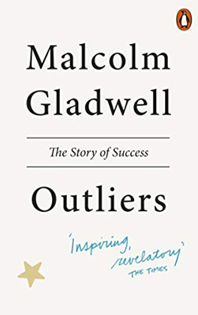Outliers – The Story of Success
Author : Malcolm Gladwell
Genre : Self Help

Outliers – The Story of Success debuted and stayed for 3 months at #1 on The New York Times bestseller list. Malcolm Gladwell (Blink, The Tipping Point) has sold almost 5 million books (typical bestseller sells 10,000). This book deals with the idea that living a successful life not only depends on individual habits and genes but also depends on what kind of community and culture one grew in. “The Values of the world we inhabit and the people we surround ourselves with have a profound effect on who we are.” Gladwell notes that the biggest misconception about success is that we do it solely on our smarts, ambition, hustle and hard work.
The book is divided into nine chapters according to the following themes:

Practice, Practice and Practice
“Is there such a thing as innate talent. The obvious answer is yes. But the closer psychologists look at the careers of the gifted, the smaller the role innate talent seems to play and the bigger the role preparation seems to play.” In a music group research, people were divided into three groups, Star students, good, and average. The research suggested that the thing that distinguished one performer from another was mainly how hard they worked. The people at the top don’t work just harder or even much harder than everyone else, they worked much, much harder. In fact, there is perhaps a magic number for practice to get true expertise: ten thousand hours.
“Practice isn’t the thing you do once you’re good. It’s the thing you do that makes you good.”
Timing is everything
Often while talking about or describing a successful personality, one refers to them as a “Self-made” entity, owing nothing to parentage or patronage. But “people don’t rise from nothing.”
Malcolm then points out that achievement in sports and studies has got everything to do with when the performer was born. Two children born in extremes of a year might be in the same class but will surely have a substantial difference between their mental development which will make the difference between qualifying for a gifted program or not. Once the kid is in an advanced stream, they learn better skills, and next year they do even better.
“The initial difference in maturity doesn’t go away with time. It persists. And for thousands of students, that initial disadvantage is the difference between going to college and having a real shot at the middle class and not.” Our idea that it is the best and the brightest who effortlessly rise to the top is too naïve. In many of the cases maturity was confused with ability, giving people a big head start.


Also, what truly distinguished the likes of Bill Gates, Beatles, Warren Buffett and Carlos Slim, was not only their extraordinary talent but also their extraordinary opportunities. Gates for example got a unique and early access to a PC, and then he made the most of it. All the Outliers were the beneficiaries of some kind of unusual opportunities. “Lucky breaks don’t seem like the exception. They seem like the rule.
Intellect vs Achievements
So far it has been established that extraordinary achievement is less about talent than it is about opportunity. Geniuses, with their IQ higher than 130 are usually considered as ultimate outliers. The higher your IQ score, the more education you will get, the more money you will make and longer you will live. But it has been found that the relationship between success and IQ only works up to a point. After reaching the IQ of 120, having additional IQ points doesn’t seem to translate into any measurable real – world advantage. IQ has a threshold. “If intelligence matters only up to a point, then past that point, other things, things that have nothing to do with intelligence must start to matter more.”
In an experiment, Psychologist Lewis Terman selected students from elementary schools with high IQs. This group of geniuses came to be known as the Termites. For the rest of his life, Terman watched over these students and every up and down in their lives were recorded. He believed that his subjects would grow up to be the pioneers in whichever field they choose, becoming the future elite of the United States. But by the time Termites reached adulthood, their careers did not reach the pinnacle Terman had predicted. Sadly, a randomly selected group of children from the same kind of family backgrounds as the termites irrespective of their IQs would have ended up almost the same as the selected group of geniuses. “Intellect and achievement are far from perfectly correlated.” The plain truth of the Terman study was that in the end hardly any of the genius children from the lowest social class ended up making a name for themselves.
Cultural Legacy and its deep roots
“Successful people don’t do it alone. Where they come from matters. They’re products of particular places and environments.” The possibility of success also depends on the time of the history. Big phenomenon such as Great Depression, World wars affected the chances of an opportunity greatly.
“The ‘Culture of honor’ hypothesis says that it matters where you are from, not just in terms of where you grew up or where your parents grew up, but in terms of where your great-grandparents and great-great-grandparents grew up.” For example, the deciding factor on how a person would react to an insult does not depend on how emotionally secure they are, or whether they are intellectuals or jerks, or whether they are physically imposing or not. What matters is where they are from. People living in circumstances similar to their ancestors’ act a lot like their ancestors.
These cultural legacies are strong powerful forces. They have deep roots and long lives. They carry on, generation after generation, virtually intact, even as the economic, social and demographic factors that nourished them have vanished, and they play such an important role in directing the attitudes and behavior that we cannot make sense of our world without them.
Turning Cobwebs into cables
“Plane crashes are much more likely to be the result of an accumulation of minor difficulties and seemingly trivial malfunctions.”
It is observed that a typical accident involves seven consecutive human errors. The list of top five pilot PDIs (Power Distance Index, respect for authority) by country was compared with the ranking of plane crashes by country, and the list matched up very closely.
Korean Air experienced many crashes due to their High PDI, as Korean language pays enormous attention to the relative standing of the two people in conversation. All these cultural traits are very unique and beautiful but simply don’t work in cockpits where copilots are to point out errors or mistakes in the judgment of the Airplane Captain. In fact, one of the top Korean airline with bad accident record moved to compulsory English in cockpit and is now having a blemishfree record!
Rice paddies and maths tests
“No one who can rise before dawn three hundred and sixty days a year fails to make his family rich.” – Old Chinese Proverb

To some people being good at mathematics is an innate ability. You either have ‘it’ or you don’t, but in reality, it’s not so much ability as attitude. You master mathematics if you are willing to try. Western children begin with a disenchantment with mathematics in third and fourth grades, main reason being that its uncoordinated linguistic structure and random/complex rules makes little sense to them.

In Japan and China, farmers didn’t have money for equipment and machines and had no extra land to turn into new fields so the only option they had to improve their yields was by becoming smarter and better manager of their time and choices. These countries mainly cultivated rice paddy fields, the people who grow rice have always worked harder than almost any kind of farmer as it is more labor intensive and the estimated annual workload of a rice farmer in Asia was three thousand hours a year. There is a clear relationship in rice farming between effort and reward. The harder one worked in a rice field more yielded, also its complex work.
Asian’s superiority in maths becomes more obvious when one realizes that students in Asian schools don’t have long summer vacations. Any culture which believes that route to success lies in rising before dawn three sixty five days a year is rarely going to give their children three straight months off in the summer. Going to school for two forty-three days a year gives students time to learn everything that needs to be learned but also less time to unlearn it.
Malcolm Gladwell is a journalist known for his uncommonly clear writing style and penchant for unearthing a story, thanks to his keen observations regarding the patterns in our ordinary lives. [As captivating as the book is, the ending is quite anti-climactic, as the book leaves us with a craving for some deep knowledgeable conclusion, which is not found]. One obvious criticism of the book is that it is oversimplifying complex social phenomenon – for example a meta-analysis did not find sufficient proof of the 10,000 hour rule.
Why should you read the book: Gladwell identifies Outliers as those who have “been given opportunities, and who have had the strength and presence of mind to seize them.” Let’s see if we can be one of them!
Goodreads Link: Outliers: The Story of Success by Malcolm Gladwell | Goodreads

 This information will never be shared with third party
This information will never be shared with third party
The book really sounds amazing! Especially the mathematics part….its sounds like worth reading….
Well articulated review Arpita. Well done!
Excellent piece!